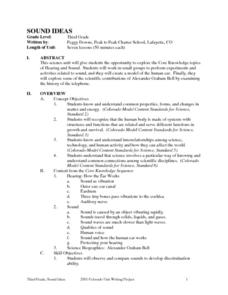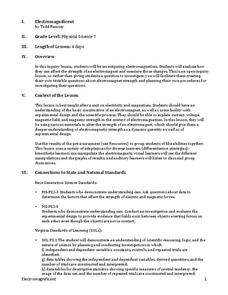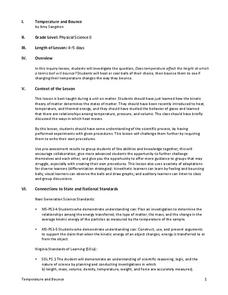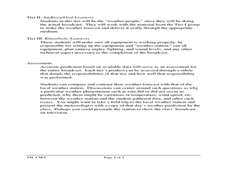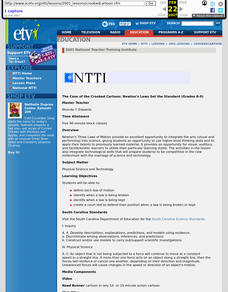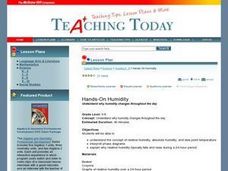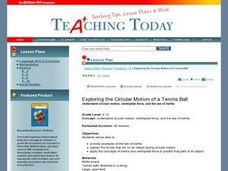Perkins School for the Blind
The Mystery Box - Making Observations and Collecting Data
Making observations and collecting qualitative and quantitative data is a vital skill all scientists need to practice. Help your scientists with partial and no sight learn how to use their other senses to make observations for...
Perkins School for the Blind
Conductors of Heat - Hot Spoons
Why is the end of a spoon hot when it's not all the way in the hot water? A great question deserves a great answer, and learners with visual impairments will use their auditory and tactile senses to get that answer. A talking...
Perkins School for the Blind
Name That Frequency
How cool! This plan uses old cassette tapes to show frequency from traveling vibrations. To prepare for the lesson, tactile frequency diagrams are made and then placed near the video tapes or dominoes that are already set up. When they...
Curated OER
QR Coded Audio Periodic Table of the Elements
Take the periodic table into the digital age with QR codes that take the scanner to an audio recording about each element from the Royal Society of Chemistry. Enlarge the image, then use a smartphone or tablet to scan the code for an...
Curated OER
Exploring Magnets and Magnetism
Here is a very good lesson on magnets, magnetism, and magnitic fields that is chock full of great activities for you to implement with your young scientists. Learners discover the properties of magnets, look at the forces of attraction...
Core Knowledge Foundation
A Time for All Seasons - Summer
The sun is shining and the birds are singing, what better time to teach young learners about the fun season of summer. In this week-long science series, children learn how the rotation and orbit of the earth influence...
Curated OER
Sound Ideas
Complete a unit of lessons on hearing and sound. Learners conduct sound experiments, research the history of the telephone and scientific contributions of Alexander Graham Bell, and create a model of the human ear.
Curated OER
Saltwater: Nifty Aqueous Colorful Layers
A classic investigation on the density of liquids is explained for you in this lesson plan. Te begin, you prepare water samples of different salinities and then add different food coloring to keep them separated and easily identified....
STEM for Teachers
Electromagnificent
This physics pun really hertz, but this STEM lesson plan can help. The inquiry-based activity has young scientists create a testable question about electromagnetic strength; plan and implement their own experiments; and record and...
Curated OER
The Day After Tomorrow: How is the Density of Water Related to Climate Change and Global Warming?
Science learners simulate what happens when ice breaks up and floats on water and how increased pressure on ice causes it to melt faster. They view a clip from the movie, The Day After Tomorrow, and relate their lab activities to what...
Curated OER
Air, Air Everywhere! Lesson 2: Acid Rain
Middle school environmentalists record the pH of four different liquids, including two aerosol cleaning products. They liken the products to acid rain and speculate in writing which might affect the human respiratory system. Although...
STEM for Teachers
Temperature and Bounce
Take part in a fun experiment and hold an impromptu bouncing contest with your class. Young scientists heat and cool balls before bouncing them to determine whether temperature changes affect how they bounce. The set of...
Curated OER
English Exercises: Listening about Tornadoes
Engage visual and auditory students with a 4-minute video on tornadoes, paired with a comprehension note and activity guide. Learners watch the video and then fill in 15 pieces of information in a chart; determine if 12 statements are...
Curated OER
Nature of Science and Technology
Fourth graders measure weather using different instruments and gather information to make science comparisons. In this weather measurement lesson plan, 4th graders have activities they can complete whether they are visual, auditory,...
Curated OER
Floating Fishes: Boat Sinking Lab
Cut milk cartons in half to make boats and let investigators attempt to sink them. They add dividing walls and observe what happens if marbles are put into only one of the newly formed compartments. Vocabulary is provided: buoyant force,...
Curated OER
The Living Environment
Sixth graders show what they know about plant and animal cells. In this cell project instructional activity, 6th graders get to choose a project based on their learning style. They can create a visual representation of cells, auditory...
National Wildlife Federation
An Energy Mix: Renewable and Nonrenewable Resources
What did the windmill say about renewable energy? I'm a BIG fan! Lesson three in the series of 12 has classes discuss potential and kinetic energy and then, in pairs, they complete a web quest over the different types of energy...
Curated OER
The Case of the Crooked Cartoon: Newton's Laws Set the Standard
Students have the opportunity to use higher-level thinking skills and to apply their talents to previously learned material. It provides an opportunity for visual, auditory, and tactile/kinetic learners to utilize their particular...
Curated OER
Determining Cutting Site Locations
Students explore DNA restriction mapping. They cut pieces of paper into lengths representing those produced when specific enzymes are used to cut a strand of DNA.
Curated OER
Cell Division
High schoolers describe the cell cycle. They make a connection between DNA replication and cell division. Students describe the parts of the cell that participate in cell division and the steps of cell division.
Curated OER
Modeling the Change of Seasons
Students evaluate data to determine changes in length of day. They model the revolution of Earth around the sun to show changes in length of day and sun angle and illustrate how the sun angle affects the change of season.
Curated OER
Hands-On Humidity
Young scholars examine why humidity changes throughout the day. They study the concept of relative humidity, absolute humidity, and dew point temperature. They interpret phase diagrams and explain why relative humidity typically falls...
Curated OER
Exploring the Circular Motion of a Tennis Ball
High schoolers are introduced to the concept of circular motion. In groups, they participate in experiments to discover the law of inertia. They describe how forces act on objects during a circular motion. To end the lesson, they use...
Curated OER
Rolling Balls: Mass and Kinetic Energy
Students identify the relationship between kinetic energy, mass, and velocity. Then they explain and graph the relationship between kinetic energy and mass. Students also predict the impact of objects of different mass and velocity on...






